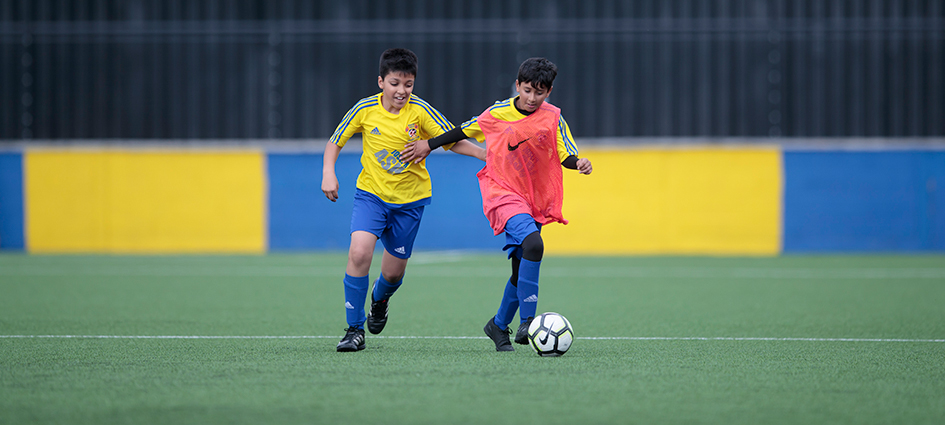
The Youth Development Phase core principles
- The Boot Room
- 04 May 2020
The Youth Development Phase DNA suggests to base your coaching around some core principles to ensure your youngsters develop both as people and as players.
Underpinned by our ethos (love the ball, love the game; developing players, developing people; inclusive experiences For All) the following core principles are the key elements running through the entire Youth Development Phase DNA:
- Creating the environment.
- Play, practice and competition.
- Developing the individual within the team.
- Play with freedom.
Fundamental to any group of players is a positive environment and this is certainly the case in the Youth Development Phase. First and foremost the environment must be safe in all aspects, during both training and matches. At an age when youngsters can be vulnerable in many ways, whilst being more likely to take risks and act independently, their safety and well-being must be prioritised.
It's also important for youngsters to 'play with freedom', being encouraged to express themselves and explore their capabilities without fear of mistakes. Your role as a coach is crucial in shaping the environment by how you behave and the positive behaviours you reinforce. The Youth Development Phase DNA will provide some considerations to help you do that.
In the video below, Merfyn Roberts, The FA Advanced Youth Award's social lead, and Phil Neville, England Women's head coach, discuss the importance of creating a positive environment.
Play, practice and competitionThe amount and type of football experiences young players engage in will heavily impact upon their development. Unstructured play, deliberate practice and competition through matches, are all important ingredients for the long-term development of players.
Matt Portas, FA Education physical performance lead, explains more about the benefits of including varied activities in your sessions:
It's important that players engage in a variety of experiences and have the chance to train and play in different-sized areas with both smaller and larger numbers. This should start in a playful way and develop into – when they're ready – a more positional way. It would be a mistake to skip stages. Remember, they’re still not adults.
In the video below, England Men's manager, Gareth Southgate, discusses the importance of appropriate game formats for player development and enjoyment.
So, how do you help players transition into 11v11? Although this is an important aspect of a young player’s Youth Development Phase journey, it can be beneficial for your players to play other game formats in addition, like 9v9, 7v7 or Futsal. Varied game and competition formats can have multiple benefits for your players across all four corners.
Developing the individual (within the team)
In the Youth Development Phase, it’s important to still prioritise the development of each individual. Remember, we need to help each player to stretch and grow their own unique capabilities, whilst embracing their individuality. Importantly, however, as they move through this phase, players also need to learn how to play with individuality, for the benefit of the team.
In the video below, Phil Neville speaks more about the importance of individuality.
There are many ways coaches can support the individual development of players across the four corners. It might be through constraints of practices with individual challenges or through the tactics employed on matchdays. One example might be to put a player in a particular playing position in order to develop a specific part of their game.
Football is a team game, so players need to learn how to be good teammates and perform particular roles within the team, however, that shouldn’t be at the expense of developing their individuality through these formative years.
Kevin Betsy, England Men's youth teams coach, discusses some ways he's developed individuals within the England U16s team.
Play with FreedomPlayers won’t yet be the ‘finished product’. They’ve still got plenty of time and room for development beyond this Youth Development Phase. We must value self-expression and encourage playing with freedom, so players can explore their game and creatively push their boundaries. But what does 'playing with freedom' actually mean in the England set-up? Kevin Betsy explains.
Importantly, players must learn to play with freedom within the framework of the team, both tactically and socially, to become good team players. Playing with freedom doesn't mean that players can just play any position they fancy or behave inappropriately to the detriment of teammates, but it does mean that players can be themselves and bring out their personality on the pitch in the way they play.
To find out more, explore our Youth Development Phase DNA playlist.


